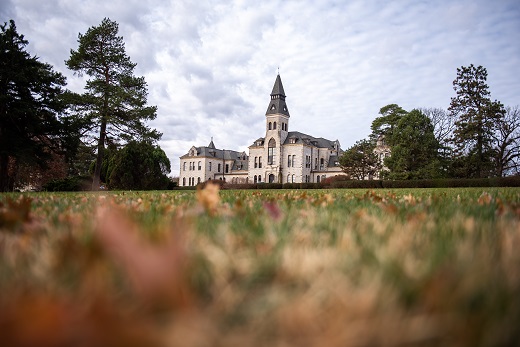

K-State Current is a weekly news update for the Kansas Board of Regents to apprise the Regents on a few of the many successes and achievements made by K-State faculty, staff and students.
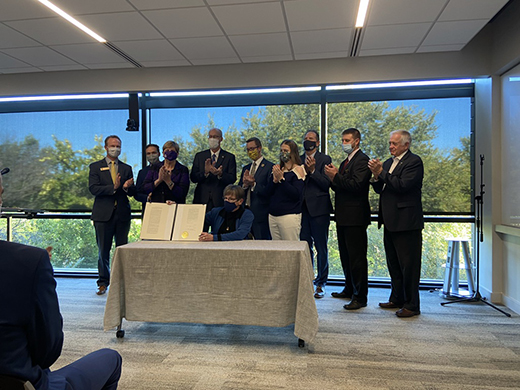
State partners with K-State engineering through University Engineering Initiative Act renewal Gov. Laura Kelly is joined by administrators from Kansas State University, the Carl R. Ice College of Engineering and others at an Oct. 18 signing ceremony for the renewal of the state's University Engineering Initiative Act.
Over the last decade, the Carl R. Ice College of Engineering has used funding from the University Engineering Initiative Act to increase its number of engineering graduates as a way to fuel economic growth and business success in Kansas.
The program was so successful in meeting its goals, funding for a second 10-year program was signed into law by Gov. Laura Kelly in April and celebrated with a signing ceremony Oct. 18 alongside Matt O'Keefe, dean of the College of Engineering and LeRoy C. and Aileen H. Paslay chair, and other leaders in engineering from across the state.
"We are pleased to see the state legislature make another crucial investment in engineering education in the state of Kansas," O'Keefe said. "This partnership has already yielded many tangible benefits to both K-State and the Kansas economy, and we're certain the next 10 years will see a continued high demand for K-State engineering graduates at businesses and firms all over the state and the region."
The ceremonial signing took place on-site at the Topeka engineering firm Bartlett & West, with Gary Clark, senior associate dean, Stacy Hutchinson, associate dean for research and graduate programs, and Sue Peterson, chief government relations officer, joining O'Keefe for the event.
This legislation will support our state’s tradition of churning out great engineers, and we’ll encourage them to use and keep their talents right here in our state," Kelly said in a statement. "I want to thank the bipartisan coalition of legislators, stakeholders and businesses who worked with my administration to make sure this program remained strong and in place.
"My administration will continue to do everything we can to support engineering talent development at our universities and provide opportunities for engineering students to succeed."
The previous University Engineering Initiative Act saw K-State reach and exceed its portion of the overall goal to increase the number of engineering graduates statewide four years early in 2017. The college's 2020-2021 class of 675 bachelor's degree graduates exceeded the goal for the program by nearly 15%.
While the original act focused on increasing the number of engineering graduates in the state to 1,365 students per year, the objective of the current funding is to increase the number of engineers working and living in Kansas.
"We are excited about meeting the challenge of providing education to students who can then contribute to the Kansas economy for decades to come," O'Keefe said. "This program will help reinforce our already strong partnerships with Kansas companies that value the work that we do."
Like the original bill, the renewed University Engineering Initiative Act provides $105 million to K-State, Wichita State University and the University of Kansas over 10 years. Each institution receives $3.5 million per year and matches it with $3.5 million per year from non-state sources.
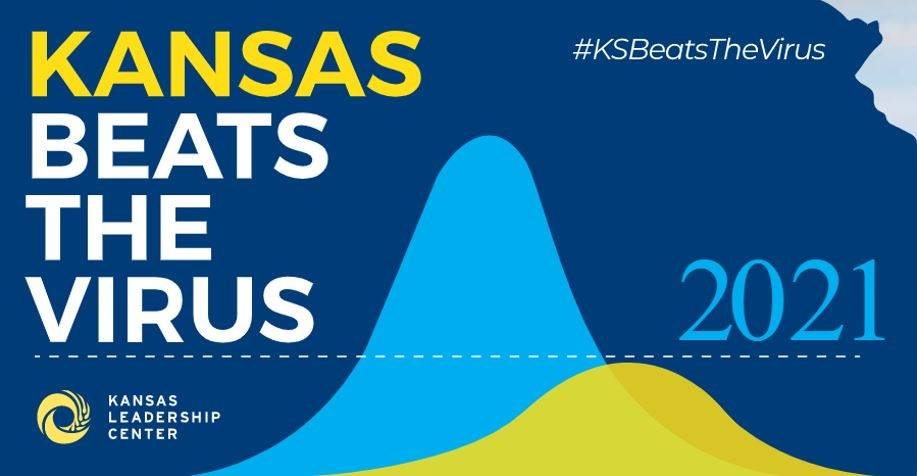
Third Floor Research — the research partnership between the Staley School of Leadership Studies and the Kansas Leadership Center — has released a new report that evaluates the grassroots efforts and networks mobilized in response to the center's call to take action to slow the spread of COVID-19.
In partnership with the state of Kansas, the Kansas Leadership Center launched Kansas Beats the Virus in November 2020. The civic action campaign was designed to improve public health practices in communities across the state. Over five weeks between Thanksgiving and New Year's Day, 4,596 Kansans participated in 851 community meetings and created 827 action projects that would help slow the spread of the virus in Kansas communities.
The result: Kansans from all walks of life rallied around a common cause and proved that:
"To better understand the impact of Kansas Beats the Virus, we set out to learn more about the process of engaging communities and to implement action projects specific to those Kansas communities," said Roberta Maldonado Franzen, lead researcher and instructor at the Staley School of Leadership Studies. "To do this, we took a multimethod approach. First, Third Floor Research at the Kansas Leadership Center surveyed everyone who participated in the initiative. Then, Kansas Business Services conducted an analysis of Kansas Beats the Virus action projects."
An online survey was sent to all participants within two months of their Kansas Beats the Virus meeting and action project occurred. The survey found that the top two indicators motivating community members to take part in Kansas Beats the Virus are "invitation by an organization I feel connected to" and "invitation by an individual I respect."
"This suggests that slowing the spread of the virus is a relational activity. Experts play a part, but leveraging relationships is key," Maldonado Franzen said.
The survey also found that two-thirds of participants felt more confident to make a difference in their community, more connected to others with a shared purpose, a better sense of responsibility for the health of their community and a willingness to engage in public health initiatives after participating in Kansas Beats the Virus.
"These results indicate that by starting where individuals are and empowering them to exercise leadership in this way, we are mobilizing an ever-expanding network of Kansans that are committed to leveraging their relationships and using their own leadership to combat the virus. This is an opportunity to continue to build on civic engagement activities," Maldonado Franzen said.
A slide deck summary of the report, as well as the full report featuring case studies of Kansans working to beat the virus in their communities, can be downloaded here.
About Third Floor Research: Third Floor Research is an applied research center operated through a partnership between Kansas State University's Staley School of Leadership Studies and Kansas Leadership Center. Research focuses on the impact of leadership training and contributes to global learnings in the field of leadership and adaptive change processes. Research findings address individual development, organizational impact and community capacity. Read more about Third Floor Research.
Internationally recognized researchers in network science and plant diseases are being recognized as the 2021-2022 Commerce Bank and W.T. Kemper Foundation Distinguished Graduate Faculty Award recipients at Kansas State University.
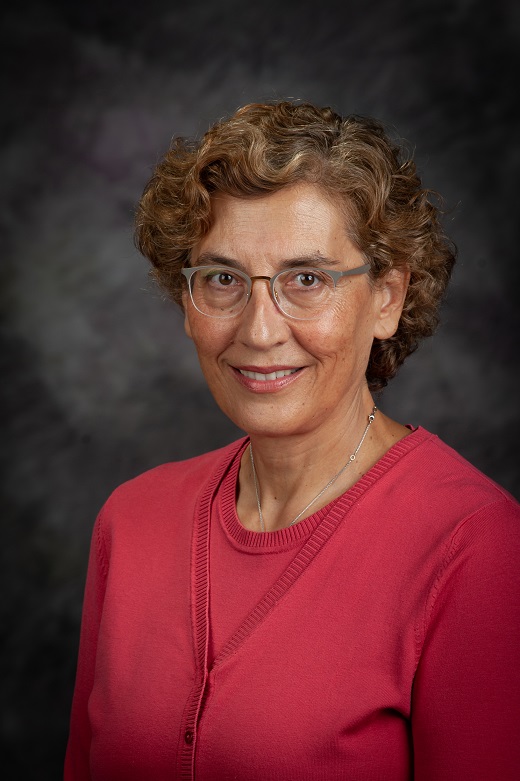
This year's winners are Caterina Scoglio , professor in the Mike Wiegers Department of Electrical and Computer Engineering, and Barbara Valent , university distinguished professor of plant pathology.
The award, supported by the William T. Kemper Foundation and the Commerce Bancshares Foundation and coordinated by the K-State Graduate School , honors current members of the graduate faculty who are recognized nationally and internationally for their outstanding scholarly achievements and for their contributions to graduate education at the university. Award recipients receive an honorarium and will deliver public lectures on their research to the campus community.
"Drs. Scoglio and Valent exemplify why Commerce Bank and the W.T. Kemper Foundation have long supported this award to recognize Kansas State University's most outstanding graduate faculty," said Shawn Drew, market president and CEO of Commerce Bank, Manhattan. "Both are wonderful educators and researchers, and they care deeply about their students. We are honored to recognize them for their outstanding work."
As an internationally recognized expert in the field of network science and contact-network models for epidemic spreading, Scoglio's work has been transformational. Her research team developed the generalized epidemic mean field modeling software, which has been widely adopted by other researchers and applied to modeling of many infectious diseases. Scoglio and her research group are often sought out for research proposals in response to new epidemics. Her team's work in the last year has been particularly significant as the team produced accurate predictions of the spread of COVID-19 in Wuhan City, China, and of the Uganda cases of Ebola in 2019.
Scoglio's research has been supported by more than $11 million in funding. She has over 100 journal publications, 73 conference presentations and has given over 35 invited talks.
In addition to her outstanding accomplishments in research, Scoglio has made important contributions to graduate education at K-State. She has mentored 23 master's students and 18 doctoral students who have been successful in both academia and industry careers in the U.S. and abroad. Scoglio's strong mentoring is also evidenced by many of her students being selected for outstanding graduate student awards in the electrical and computer engineering department.
Scoglio earned her doctorate in engineering from the University of Rome. She joined K-State's electrical and computer engineering department in 2005. Her work has been recognized with several awards from K-State, including the Engineering Distinguished Researcher Award, the Frankenhoff Outstanding Research Award, Steve Hsu Keystone research faculty scholar, Professorial Performance Award and the Research Proposal Teamwork Award.
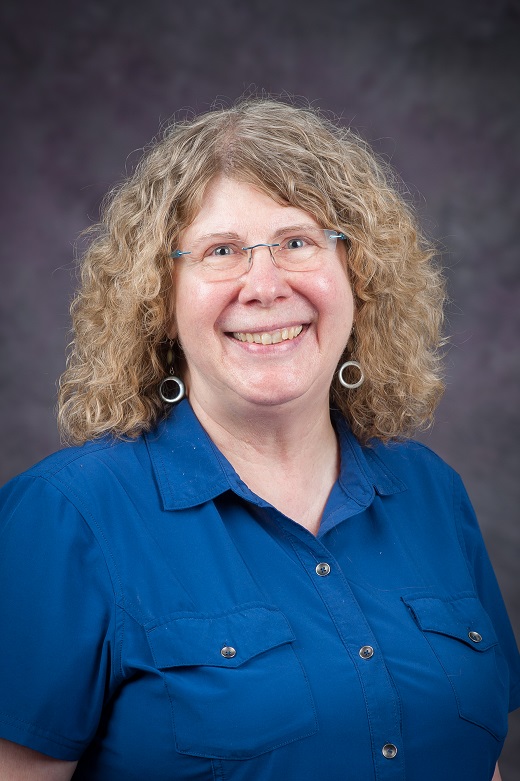
An internationally recognized scholar, Valent has made high-impact contributions to our understanding of plant diseases that threaten global food security. She has spent decades studying fungal diseases — blasts — in rice and wheat, which threaten crops both in Kansas and worldwide. Valent's research team pioneered microscopic techniques for visualizing molecular plant-microbe interactions in real time. Her work has been influential and has been adapted by peers to study other plant-pathogen interactions.
Valent has been successful in securing over $14 million in grant funding as principal or co-principal investigator. She has authored more than 130 peer-reviewed articles with over 19,700 citations. Much of Valent's work has been published in elite and highly interdisciplinary journals. For her work published in The Plant Cell, she was named "Top Author" by the American Society of Plant Biologists.
Valent's contributions to graduate education at K-State include serving as chair of the interdepartmental genetics program since 2004. In this role, she has provided administrative and academic leadership and worked to establish the Genetics Doctoral Fellowship Program. Valent provides guidance to many students in the program and has directly advised seven graduate students. In 2010, her support and mentorship were recognized by students in the plant pathology department with their Mentor Award.
Valent earned her doctorate in biochemistry from the University of Colorado. She joined K-State's plant pathology department in 2001. In 2002, she earned K-State's highest academic ranking of university distinguished professor. She also has earned national recognition for her work, including being recognized as a fellow of the American Phytopathological Society and of the American Association for the Advancement of Science. She received a Lifetime Achievement Award in Rice Blast Research in 2019 and was elected to the National Academy of Sciences in 2020.
Scoglio will give a public lecture on her work at 3 p.m. Wednesday, Nov. 17, via Zoom. Valent will present her work in a public lecture in the spring semester, which will be announced at a later date.
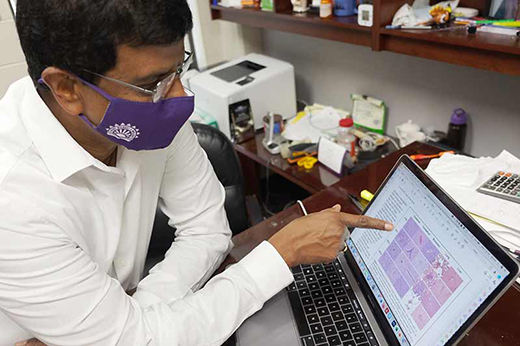
New $325,000 grant supports first U.S. research project into novel tick diseaseResearchers at Kansas State University are the first in the United States to look into methods of keeping a foreign tick-borne livestock disease at bay.
The Center of Excellence for Vector-Borne Diseases recently received $250,000 from the U.S. Department of Agriculture and an additional $75,000 from the state of Kansas' National Bio and Agro-Defense Facility Transition Fundsto build upon past research into containing and controlling heartwater disease, which is caused by the tick-transmitted pathogen Ehrlichia ruminantium. Heartwater is deadly to cattle, sheep and goats.
Roman Ganta, professor of diagnostic medicine and center director, and his team recently published results of the first heartwater risk assessment experiments in sheep in the U.S. using several pathogen strains imported from sub-Saharan Africa. The new funding will extend collaborative research to further define pathogenesis and vector competence of ticks native to the U.S.
While heartwater originally was identified as a sub-Saharan African disease, it has been established in several Caribbean islands, posing a potential threat to the U.S. cattle industry.
"The possible introduction of heartwater from the Caribbean and through imported exotic foreign animals from Africa is a major concern to the US food animal industry," Ganta said. "The USDA-estimated cost of heartwater could be as high as $2.3 billion in losses to the U.S. economy."
The disease is characterized by fever, labored breathing, coughing, neurological signs, hydrothorax, ascites and edema of the lungs. High mortality rates up to 90% can occur in livestock if introduced into a non-endemic area, such as to the mainland U.S.
"Despite its enormous importance, effective means of diagnosing and controlling the disease are not available," Ganta said. "Currently, there are no approved diagnostic tests or vaccines for heartwater disease in the U.S. The far-reaching goals of our heartwater research are to develop rapid diagnostics and a vaccine."
The project will be the first to have strategic collaborations with the USDA and NBAF. Among its goals are to establish future collaborations with researchers in the Caribbean and Africa. Developing better methods of controlling heartwater will be critical in improving food animal health and the economies in sub-Saharan Africa and parts of the Caribbean where the disease is widespread.
The Center of Excellence for Vector Borne-Diseases is an interdisciplinary research center focused on pathogenesis, surveillance and prevention of tick-borne diseases and other vector-borne diseases of significant importance to animal and human health. The goals of the center are to prepare Kansas State University for building a strong program on vector-borne diseases, developing a network to build collaborative research involving scientists from the university with other academic institutions from the U.S. and abroad, training a new generation of scientists with expertise on vector-borne diseases, and developing additional resources.
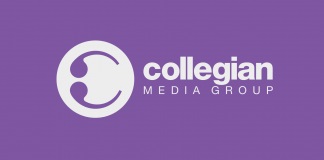
Kansas State University's Collegian Media Group won multiple awards at the National College Media Convention on Oct. 14-16. The Associated Collegiate Press and College Media Association co-organized the virtual event.
The 2020 Royal Purple yearbook was among five yearbook finalists for the Pacemaker Award. The Pacemaker is considered the Pulitzer of college journalism.
"We spend countless hours working on the Royal Purple each year and always aim to create a quality yearbook no matter what, even during a pandemic," said Hallie Everett, Royal Purple editor-in-chief. "After the two unique and challenging years we've had, it is especially meaningful for our hard work to be recognized because we are proud of what we accomplished."
The 2021 Royal Purple yearbook won second place and The Collegian newspaper won fifth place in the American Collegiate Press best of show competition.
"We're growing with every edition we put out, and recognition like this shows we're headed in the right direction," said Jared Shuff, editor-in-chief of the Collegian.
Students who attended the convention also chose from more than 100 educational sessions and networked with other college media students and professional journalists from across the country.
The Collegian Media Group publishes The Collegian, Royal Purple and Manhappenin'. Additional awards include:
2021 Associated Collegiate Press best of show awards
• Third place, Advertising Rate Card, Collegian Media Group
2021 Associated Collegiate Press individual awards
2021 College Media Association Pinnacle individual awards
You can support our students and their efforts by donating to the Collegian Media Group's student scholarship fund.